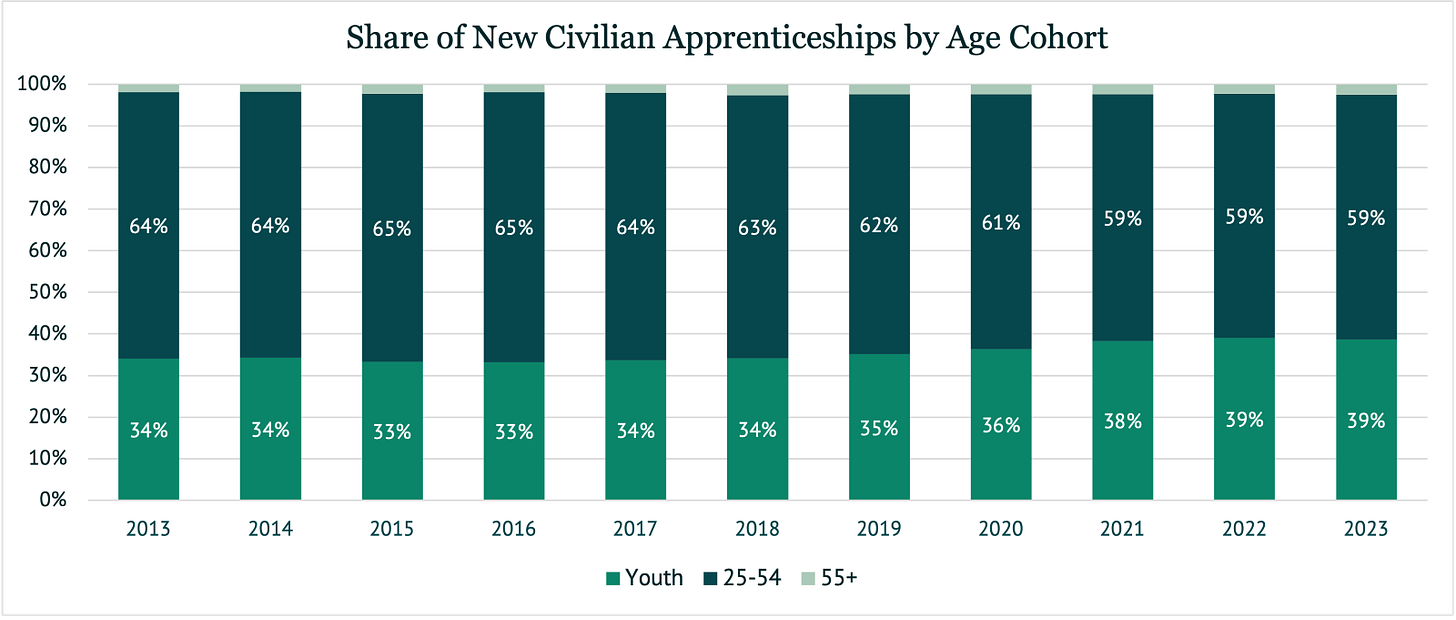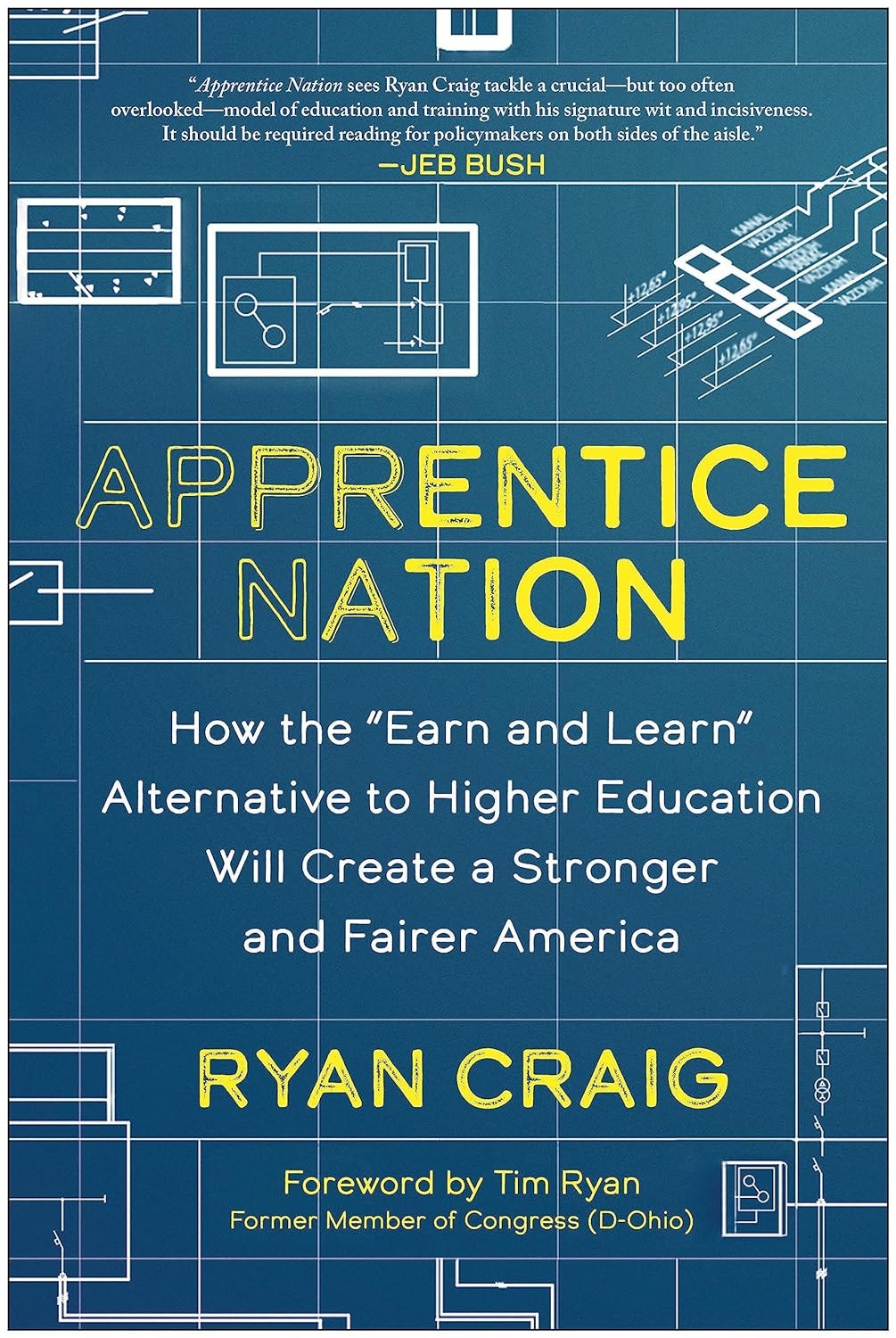We need more apprenticeships
For young men struggling to transition into work, apprenticeships are a good alternative to college

There are too many men—especially young men—missing from the workplace. Since 2000, labor force participation for young men ages 20-24 has dropped almost 10 full percentage points. And not because they’re headed to college: the number of young men enrolling in postsecondary education has dropped steadily over the last decade, as concerns grow about the value of a college degree.
Men Not at Work
Obviously the pandemic hit employment like a meteorite, for almost all workers. But young men especially have been slow to return. Despite low unemployment rates amidst high numbers of job openings, young men only recently surpassed pre-pandemic participation levels.
The downward trend in male employment long precedes the pandemic. Over the first couple of decades of this century, employment rates have dropped for men aged 25-34. Meanwhile there are fewer young men aged 16-24 in school:
There’s lots of debate among economists about what’s driving these trends (see here, here and here). But one thing seems clear. There is a big gap in our education and skills system, between a high school diploma and a college degree, and it’s men who are most likely to fall into it.
The good news: there is a strong alternative available, apprenticeships.
The bad news": policymakers aren’t investing enough in them.
Where are America’s Apprentices?
This week sees the publication of an almost-definitive guide to apprenticeships: Ryan Craig’s new book, Apprentice Nation How the "Earn and Learn" Alternative to Higher Education Will Create a Stronger and Fairer America.
Craig caustically describes mainstream higher education as a “train and pray” model i.e. spend year learning, and hope it pays off in the labor market. He then points out the gigantic imbalance in current policy investments:
Current funding for apprenticeship is a fraction of what we spend on “train and pray”: federal, state, and local governments continue to pour nearly $500 billion each year into college, while total spending on apprenticeship is under $400 million. That’s a ratio of over 1,000:1. If we compare a single apprentice to a college student, we find that the apprentice receives less than 3 percent of what taxpayers spend on the student.
You read that right. For every dollar we spend on apprenticeships, we spend $1,000 on college. To be clear, college remains largely very valuable, and much of the current rhetoric is misplaced or misinformed. (For a strong statement about the continued economic value of see David Deming’s excellent Atlantic article, “The College Backlash Is Going Too Far”).
But there’s no question that as a nation, we are massively underinvesting in vocational education and training, including on apprenticeships, especially by comparison to other advanced economies. Robert Lerman, a scholar at the Urban Institute and co-founder with Ryan Craig of Apprenticeships for America, pointed out in a 2019 report that:
…The United States has lagged far behind other developed countries–countries like Germany and Switzerland, but also Australia, Canada, and England–in creating apprenticeships. In these countries, apprentices constitute about 2.5-3.0% of the labor force, or about 10 times the U.S. rate.
A recent post from Scott Galloway, “Boys to Men”, a must-read in its entirety, hammers home this international disparity:

You might be thinking that this is for long-established historical reasons. Maybe apprenticeships are just “more of a European thing” (and perhaps especially a German thing). One of the key contributions of Craig’s book is to explode this historical myth. He shows that many of today’s leaders in apprenticeships, including the UK and Australia, were in a similar position to the U.S. only a few decades ago. The growth of apprenticeships in those countries did not happen by accident. It was the result of intentional, sustained public policy.
There’s been some growth in recent years in the U.S. But apprentices still account for only about 0.5% of the civilian male labor force:
What’s required is a step-change, not just incremental growth.
Apprenticeships skew male, and that’s O.K.
Tim Ryan, former candidate for the U.S. Senate in Ohio, notes in his foreword to Craig’s book that when he was campaigning, his calls to “bring back shop class” got the loudest applause. “People know the current system is broken”. And he goes on:
Everyone who’s been an apprentice, whether as a plumber, welder, or electrician, understands how powerful it can be to learn on the job and to earn a paycheck while building skills you can carry through your future career. Unlike in college, you can see from day one how what you learn translates to your work.
That’s right. And it’s one reason why vocational learning seems to particular benefit boys and young men; they seems to learn better when they can see a more immediate point. (See last week’s post on “Vocational education is male-friendly learning”).
This is why Craig’s vital new book is only almost definitive: he shies away from the fact that the lack of investment in apprenticeships is especially bad news for young men. But given the position of young men, the pro-male orientation should be seen as a feature, not a bug.
In 2022, 85% of new apprenticeships were for men, compared to 93% in 2013.

The main reason for the outsize male share is the industry makeup of apprenticeship programs. Male-dominated occupations account for most apprenticeships, especially in construction: electricians, carpenters, pipefitters, ironworkers, and other trade workers. Some of these occupations actually require an apprenticeship to enter.

Apprentices that are women, especially young women, are more likely to be in jobs like pharmacy tech, nursing assistant, or childcare worker. As apprenticeships have expanded, albeit painfully slowly into these industries, the gender gap has narrowed somewhat. New apprenticeship programs also offer careers in more white-collar professions like software development, insurance, or law.
Between 2013 and 2022, apprenticeships in “Professional, Scientific, and Technical Services,” an industry that includes App Developers, IT Specialists, and Cyber Security Technicians, grew 15 times faster than apprenticeships as a whole. Of new apprentices in these fields, in 2002, 43% were women.
If apprenticeships expand, especially into newer industries, the gender skew will be reduced. But it will not be eliminated. More men than women will still be apprentices. Given the big gender gaps the other way in mainstream education, that’s OK.
Apprenticeships work
Almost all apprentices, 93%, end up with a job at the end of the program. Former apprentices have an average starting salary of $77,000. Registered apprentices also experience faster earnings growth relative to demographically comparable peers. Apprenticeships offer an alternative pathway to college, with three out of four having just a high school diploma:

Apprenticeships can also help meet the demand for labor, both in the traditional and newer fields. There is rising concern about a potential shortage of carpenters and plumbers, for example, especially as older trade workers age out of the workforce. Apprenticeships are commonly pitched as a “win-win” for both employers and workers. Studies have shown that employers earn a 40-50% return on their investment in a registered apprenticeship program, getting benefits from both apprentices’ production while working, and the development of skills that will suit an employer’s specific needs once they graduate to full employee.
We should focus more on younger workers
If you’re asked to picture an apprentice, odds are you’ll think of a young person. And apprenticeships are in fact more common among young workers: about a third of new apprentices are under 25. But it may come as a surprise to you (it did to us) that the age of the typical apprentice in the U.S. is not 19, but 29.

As the authors of a data-rich report from Jobs for the Future report note:
Unlike apprenticeship systems in other parts of the world, the U.S. Registered Apprenticeship system isn’t built as a career pathway for young people.
(Disclaimer: Richard sits on the Board of Jobs for the Future).
In some ways this is good news. It shows that apprenticeships aren’t only for those entering the workforce. They can also help people to retrain later on. But given the evidence showing how many young adults, especially men, are getting derailed badly in their early 20s, there is a strong case for focusing more on the under 25s, and for positioning apprenticeships as an explicit alternative to mainstream college.
This could involve some simple nudge-like shifts in information. From 2024, the UK’s university admissions portal will be broadened to include apprenticeships too, providing a single portal for post-secondary learning opportunities. Imagine if the Common App could do something similar in the U.S.
There is also a strong case for focusing the financial incentives related to apprenticeships towards younger workers. There are some states and cities moving in this direction:
Maryland is working on legislation to form an “Apprenticeship 2030 Commission" with an explicit goal of 45% of high school graduates participating in a youth apprenticeship program.
In 2017, Aon, Accenture, and Zurich North America founded the Chicago Apprentice Network to provide apprenticeships and education for young workers starting their career, often students from local community colleges.
In Wisconsin, over 8,000 high schoolers can get at least 450 hours of paid, on-the-job learning combined with 180 hours of technical instruction before graduation in fields like finance, manufacturing, or agriculture.
In Missouri, finishing high school is tied to finishing a youth apprenticeship.
But this is an area where the Federal government must play an important role, especially in terms of funding. Congress is considering a new, bipartisan act to expand and modernize the apprenticeship system. If passed, the Bill would commit almost $4 billion in funding to apprenticeship programs over five years, with the goal of creating 1 million new opportunities.
This seems like the kind of legislation that ought to attract support from both Democrats and Republicans seeking to provide alternatives to college, especially for young men from working class backgrounds. If not this, then what?
There is much more to say about building up alternative pathways for learning, and we will in fact be saying much more through the American Institute for Boys and Men. That includes high school CTE, technical high schools, K-14 programs like P-TECH, community college vocational courses, “returnships” for career switchers, and much more.
But apprenticeships present the most immediate opportunity for policymakers to invest in “earn and learn” programs. Given current trends, the fact that this will especially help young men simply adds greater urgency to the task.








I stumbled into the power of apprenticeships, and I heartily agree with sentiments of this article.
When my eldest was 17, he told me that he didn't think he wanted to pursue college. I asked him what sort of career path he wanted to explore. He said, aviation. (He'd always been fascinated with flying things...drones, planes, hawks). He told me he could become an airframe and powerplant mechanic (AMP) by logging 4000 hours under supervision of a certified AMP and passing an FAA exam. Once certified he could afford to pay for flight lessons.
Well, he certainly had a more profound career plan than I did when I was 17. He's now 18 and just past the half-way point to get his AMP certification. He still enjoys the work...and getting paid to learn about his passion.
My second son is 16 and has been working as a full-time carpenter for a year and a half. He loves the work and plans to run his own crew next year. But he's also interested in college and plans to enroll in introductory chemistry and physics course at the local community college. While he didn't matriculate through a formal apprenticeship, I think the work experience has helped him understand the aspects of the world he'd really like to explore, maybe formally in college, or informally in his hobbies (wood and leather working).
Personally, I wasted a lot of time (and money) at a university. I think I may have been better off going to work, first. I think the workplace forces a focus on: what can I do to add value, what do I want to do, what am I good at? Having a better awareness of oneself might help us get more out of our higher education or help us find a different path to a career.
Thank you for the insightful article.
Hi it's me again. lol. I'm a community affiliate research coordinator and very curious about this topic. Got a few questions and thoughts here:
1. How exactly do we define "apprenticeship"? What differentiates this from internship? For instance, what about a coding bootcamp? That seems like an apprenticeship, but is it?
2. Also, while we wait for policy to happen, what are some ways to encourage organizations to take the steps to be ready for a formal apprenticeship?
3. Similar to the coding question, are there ways to transform jobs that are traditionally only accessible through college into jobs that can be accessed through internships? I'm thinking of orgs like yearup and opportunity @ work that offer internships at fortune 500 companies that break the "paper ceiling"
would love to have this discussion with everyone here hehe